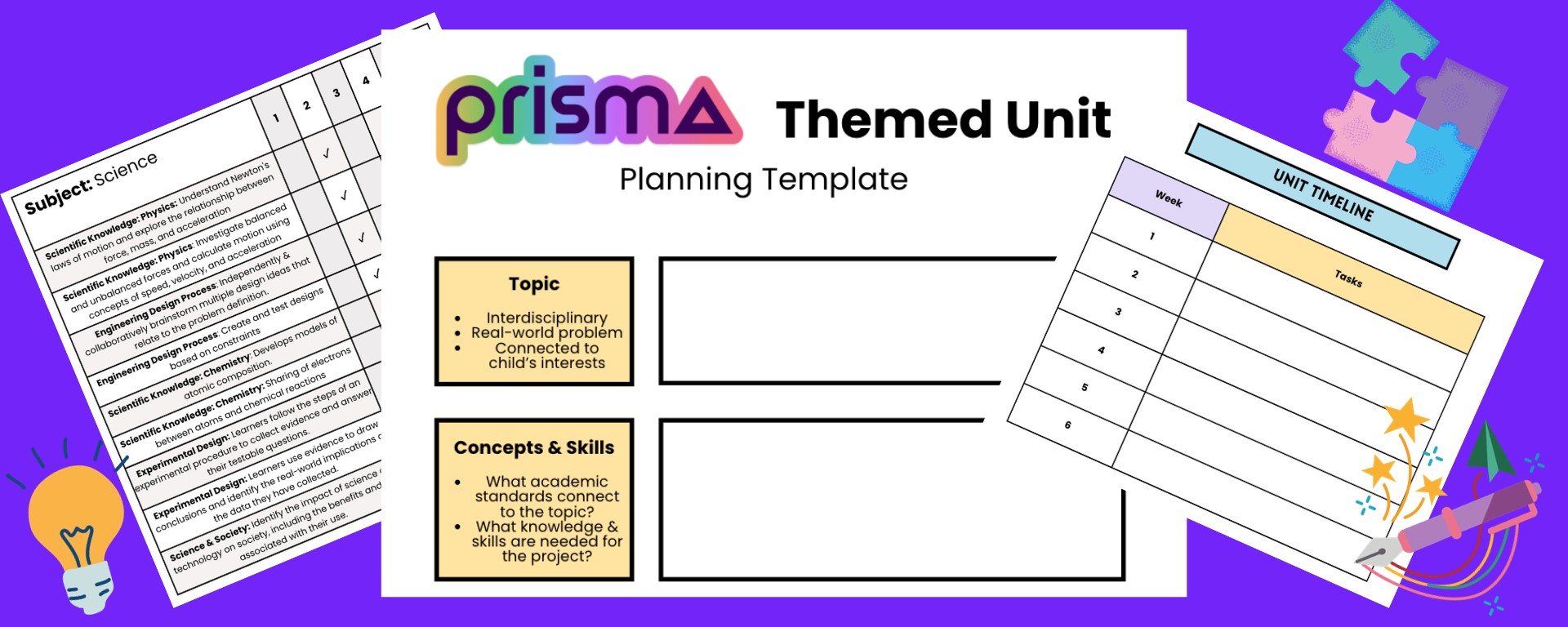A child may not know what he needs to know in ten years, but he knows better than anyone else what he wants to know right now, what his mind is ready and hungry for. If we help him to learn that, he will remember it, use it, build on it. If we try to make him learn something else we think is more important, chances are he won’t learn it. He will soon forget most of what he learned, and what is worst of all, will before long lose most of his appetite for learning anything. –John Holt, “Teach Your Own”
Homeschool families know better than anyone: learning is deeper and more meaningful when learners can follow their interests. You’ve probably seen this firsthand—maybe your child taught themself to use complicated editing software because they wanted to make YouTube videos, or memorized every fact about Ancient Egypt but can’t seem to remember the biology facts you’re trying to teach them.
Understanding your child’s unique learning style makes this interest-driven approach even more powerful, allowing you to tailor unit studies to how they learn best.
The unit study approach is one of the most research-backed homeschool methods precisely because it allows for interest-driven learning. Learning science has proven that when curiosity about a topic is activated, the brain is primed to absorb and retain more information. Unit studies are also a form of interdisciplinary learning, a cutting-edge method designed to build real-world skills like creativity, critical thinking, and communication.
At Prisma, our team of project-based learning experts designs thematic units for grade levels 4-12. In this blog post, you’ll find best practices for creating your own unit studies, free unit study ideas from our most popular themes, and a printable unit study planner to bring your homeschool curriculum to the next level.
What is the unit study approach?
The real world is not divided into school subjects. Solving hard problems requires a blend of knowledge and skills from various disciplines.
Interdisciplinary education integrates knowledge and skills from different disciplines into one learning experience. Unit studies are an interdisciplinary approach to homeschooling, where learning is organized into units combining academic subjects under one theme.
For example, in our “Cities of the Future” theme, middle school learners explored the real-world topic of urban development through hands-on learning activities. By creating everything from model cities, eco-friendly buildings, and public art, kids learned concepts traditionally taught in science, social studies, math, and English.
Mini Unit Studies offer a shorter alternative, typically lasting 1-2 weeks instead of several months, perfect for busy families or those just getting started with the unit study method.
How Unit Studies Lead to a Love of Learning
Why is the unit study approach such an effective homeschooling style for kids? Here are a few reasons:
- Hands-on creativity: Unit studies allow learners to explore a topic in many ways. At Prisma, all themes end with learners creating a hands-on project, from science experiments to 3D models to museum exhibits. Projects aren’t only fun for kids—learning science research shows when learners apply their learning through creating something, they learn more, too.
- Real-world relevance: In traditional curriculum with isolated academic subjects, you might hear your child say “Why do I need to know this?” In thematic units, kids see how each subject connects to the other subjects, and to a real-world topic. For example, instead of writing a 5-paragraph essay about a random topic, kids write a persuasive product pitch for an invention they engineered (like learners did in our Inventor’s Studio theme), helping them understand why it’s important to learn how to write for any future career.
- Deeper learning: Blending subjects together under one unit study topic allows for more in-depth exploration of concepts. Kids will retain more (and feel less stress and overwhelm!) from a deep dive over 6 weeks than a year of bite-sized chunks while juggling seven other topics.
- Interest-driven learning: Unit studies allow kids to apply their strengths in one subject area to another. Imagine an artistic learner who says “I hate science,” but discovers an appreciation for biology after a unit study about plants incorporating art.
This approach naturally incorporates multisensory learning, engaging visual, auditory, and kinesthetic learners through varied activities and hands-on projects.
How to Create a Unit Study Curriculum?
At Prisma, our team of learning designers uses our collective expertise across subjects to map out a full year of interdisciplinary units. But with a bit of planning, this process can be done at home!
Here’s the steps to try your hand at creating your own unit study:
- Map out the learning goals. Look through the list of concepts, standards, or skills you’re hoping to cover (or find them listed in your existing curriculum). Look at standards for multiple subjects at the same time, to nudge your brain to spot connections between them.
- Connect learning goals to unit study topics of interest. This part gets messy! Identify connections between the skills & concepts you need to cover and potential themes. You know best what will engage your children! Perhaps you’ll select a real-world problem they’re interested in, or a favorite topic to learn about. Ensure it connects to multiple subjects. For example, the topic of “Pollution” could connect to science concepts like ecosystems and chemical change, plus social studies concepts like civics and advocacy.
- Brainstorm hands-on activities. Imagine how kids can learn about the topic in a hands-on way (such as science experiments in a science unit, or field trips in any unit). Also consider how they can apply their knowledge by creating a larger project. For example, in a pollution unit study, an artistic learner could make infographics or a graphic novel educating the public. Budding engineers could build prototypes of pollution solutions. Others could plan an event, make a museum exhibit, code an educational game…the sky’s the limit!
- Integrate language arts. Reading and writing are essential to understanding any subject, so they should be a part of every unit study. At Prisma, each learner chooses from a book list connected to each theme. When selecting a writing component, make sure it relates to the way writing is used in the real world connected to the topic. So, instead of having your child write a persuasive essay about pollution, why not have them submit an op-ed to a local newspaper?
- Literature-based unit studies. Build entire themes around classic or contemporary books, seamlessly weaving reading comprehension with subject-area learning.
For families who prefer ready-made options, Homeschool Unit Study Kits from various curriculum companies provide structured, complete unit studies with all materials and lesson plans included.
Unit Study Topic & Hands-On Project Ideas
Need examples of different topics? Here are some of our past themes:
- Build a Business (Economics, math, design thinking, and web design): Learners created a business plan and budget for a product or service-based business, tested their idea with customers, and built a business website.
- World of Wonder (Earth science, poetry, math, and visual art): Learners researched the science of earthquakes, tornadoes, volcanoes, and hurricanes. They used their math skills to predict the likelihood of various disasters. Then, they created artistic representations and poetry representing a disaster of their choice.
- Unsolved Mysteries (History, digital citizenship, journalism, and technology): Learners investigated the mystery genre by reading fictional mysteries and researching real-life mysteries, from D.B. Cooper to Amelia Earhart to the Gardner Museum Heist. They wrote an investigative article about their mystery and used tech tools to edit a video, podcast, or evidence model.
- 8 Billion Stories (World cultures, literature, and performing arts): Learners researched forms of performing arts (theater, film, music, and dance) from cultures and countries around the world. They read a fiction book taking place in another culture, and then created their own performance inspired by a culture they belong to.
- Hidden Histories (History, art, and literature): Learners studied multiple time periods from history (the American Revolution, Civil War, and Great Depression) and then chose a story of a person who was lesser-known to feature in a play, portrait gallery, or monument design.
- Uncharted Territories (Biology, geography, creative writing and history): Learners investigated the topic of exploration: Which parts of Earth have been explored in the past? Which territories are unexplored, such as outer space or the deep ocean? By studying the biology concepts of ecosystems & adaptation, they understood why certain territories may not be friendly to exploration. In the project, they invented their own ecosystems and creatures who could adapt to survive there.
- Playology (Physics, engineering, financial literacy, and fiction): Learners dove into the business of toys. They researched toys through history, then engineered their own moving by studying the laws of motion. In a business simulation, they played as toy shop owners and learned about budgeting, calculating profit, and meeting customer needs. They read famous “toy stories” like The Velveteen Rabbit.
- Legend Has It (History, geography, philosophy, and public speaking): Learners explored mythology and legends from around the world. They each chose one legend to research and read multiple versions of it, while also studying the history & geography of the civilization it originated from. They used The Odyssey legend to have group Socratic discussions about philosophical questions. They also learned about oral storytelling and told their own “legend” from their life to a group.
- Food Lab (Biology, chemistry, ethics, and world cultures): Learners studied what chemical reactions happen in the kitchen through hands-on experiments, and researched food’s effects on the human body. They also explored modern ethical dilemmas related to food, and learned about variation in recipes and ingredients across cultures.
- Wild Inventions (Biology, engineering, public speaking and technology): Learners used the technique of biomimicry to invent useful products. They researched the structure & function of various organisms and then engineered a product using design thinking and 3D modeling tools. They prepared a pitch presentation for their product.
Popular Family Unit Studies include themes like Space Unit Study exploring astronomy and space exploration, Bird Unit Study focusing on ornithology and migration patterns, or Earth Day Unit Study combining environmental science with activism and conservation projects.
More Free Unit Study Resources
- This list of free unit studies for all ages
- Literature-based unit studies from BookShark
- Newsela for current events articles adjustable to multiple age levels
- TedEd for engaging, quality videos on a variety of topics (you can even custom-make your own digital lessons)
- PBS Design Squad Global for hands-on activity ideas
- PBS Learning Media for lesson plans, videos, and project ideas; especially strong for the arts
- Common Sense Media reviews for finding movies, TV shows, and games connecting to your unit study topics
- Instructables for step-by-step instructions and printables for engineering and design projects.
Many curriculum companies now offer comprehensive unit study programs that include all materials, learning resources, and structured lesson plans for busy homeschool families.










